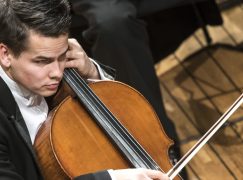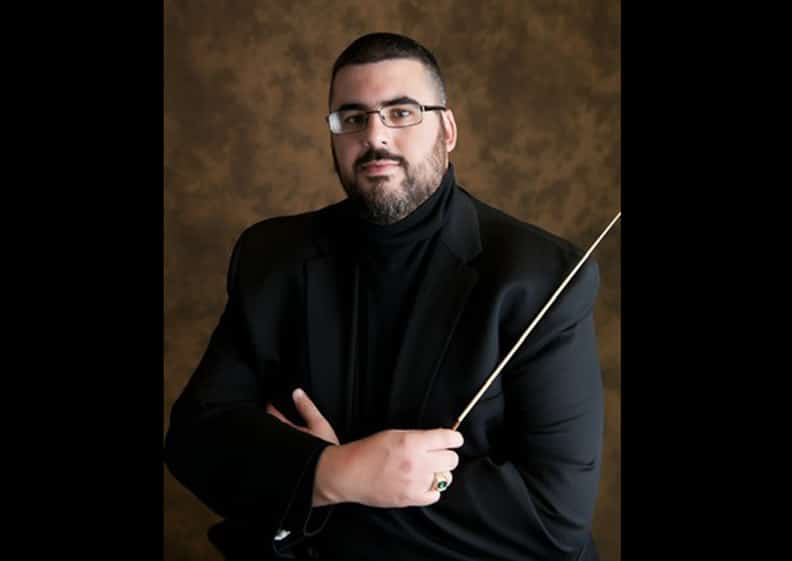Czech Phil principal cello wins Prague Spring prize
mainVáclav Petr, 29, principal cello of the Czech Philharmonic, won the Prague Spring International Competition last night.
He was awarded second prize. The first prize was withheld.


Václav Petr, 29, principal cello of the Czech Philharmonic, won the Prague Spring International Competition last night.
He was awarded second prize. The first prize was withheld.

Our attention has been drawn to this incident…

A social media activist has circulated a video…

A concert at the Teatro Maggio Musicale to…

The musicians picked their moment to blank the…

Session expired
Please log in again. The login page will open in a new tab. After logging in you can close it and return to this page.
Is it only the classical music world that operates this stupid policy of “not awarding a first prize but awarding a second prize?” If this gentleman was the best of all the competitors then he should have won first prize. Perhaps the judges will explain the criteria they were using to assess competitors and which of those, this competitor did not meet. A complete and utter farce!
AKC dog shows do as well. The judge has the option of awarding 2nd, 3rd and 4th prizes in a class (for lack of merit) or withholding Winners altogether. Just depends on the exhibit not coming up to the standard the judge holds in his head.
Without being able to comment on the present case, I prefer to know that the high standard expected has not been reached in certain cases when first prize wasn’t awarded. I’ve heard certain finals where a first prize was certainly not deserved and the winner sets off on world tours, leaving a trail of disappointment before sinking with little trace.
And not only your “classical” enemy indulges in this “farce”… several years have had no Nobel Peace Prize awarded, rightly so if there’s no deserving candidate.
So the short answer to your contemptuous question is: No!
Could you explain why my questions is contemptuous, if there are a group of musicians competing then the best of the bunch is awarded first prize. Levels will vary from year to year but that is the nature of things, so explain to me why a first prize was not awarded to the best of this group of competitors. Does this mean that if Usain Bolt doesn’t break a world record in the Olympic 100 meters final he should not be awarded the gold medal but “relegated” to the silver position because to quote you, “he hasn’t reached the high standard expected”
“Is it only the classical music world that operates this stupid policy…”…… “A complete and utter farce!”
I’d have said that this expresses your habitual contempt for the “classical music” world!
Music is not sport. In most cases of sport, there is a “winner,” (team or individual), whatever the level or quality. It can’t really be otherwise, we’ve all seen miserable finals (i’m a tennis fan, for instance), which didn’t match the quality of earlier rounds, but by definition somebody “wins” even with general poor quality. The Bolt analogy doesn’t apply cos there are no records to break in music, but i forgot; you don’t find any qualities in “classical” so it’s hard to explain to you.
“Music is not a sport” you say, but it was a music “competition” i.e. musicians were competing against each other (yes, I know you consider that rather crass and bourgeoise) and as such whoever came first in the competition should have been awarded the first prize. I note that you didn’t address the issue of the assessment criteria and where the “winner” fell down in matching the desired criteria.
As regards your comment that I “don’t find any qualities in classical music”………well, I have been listening to classical music from my early 20s and as I approach my 70th year will continue to do so. I find the occasional quality in Mahler, Shostakovich, Strauss and Janacek, but occasionally the mask slips and out comes the Led Zeppelin CD for a dose of “When the levee breaks”…………….
Well, i’m happy to see that you’ve defended your “classical” position quite wittilly, so i’ll retract my implication that you find no qualities in classical!
I can’t address exactly the issue of assessment criteria, it’s already a very inexact science, and often unfair anyway, but in most cases technical mastery of the instrument, style and artistic expression would be the essentials. Other factors could operate, personal charisma, audience appeal, etc, and too often, nepotism, politics, compromise….don’t get me started!
The main point is surely that music should be the “winner!” There’s no point in awarding a first, or any prize if the musical result is sub-standard, (out-of-tune, poor tone, memory lapses, stylistic anomalies, lack of projection….). A clearer example would be the blind auditions for an orchestral post; the jury/panel are not interested in the “contest” aspect or the image, they just want a player who meets their demands. There’s no point in them giving the job to the “best of the bunch” if even the best of them doesn’t come close to the desired standard. If you interviewed candidates for any responsible job in business and nobody came close to what you needed, would you take on the “best of the bunch” anyway? I don’t think so.
He’s a fantastic cellist. I was really impressed about year and a half ago when he and two young Philharmonic section mates played the Penderecki triple concerto (or whatever it’s called; all three sounded like they could be major soloists).
I don’t see how winning an award at this competition is any kind of a step up for him; isn’t being Principal of the great Czech Philharmonic already a much bigger deal? (though, admittedly, to win the job he probably had to defeat a largely Czech field, rather than an international one).
If you want to make a better living it is. Czech Phil musicians are woefully undercompensated in comparison to their EU counterparts.
I know they’re not well paid. I’m just not sure winning this competition enhances his reputation, given his current job.
At the Czech Philharmonic, we are very happy for Vaclav and very proud of him. It requires lots of courage to enter such a competition, when you have already a prestigious post. The risk is enormous: in a big international competition, you can be eliminated quite easily, even if you play really well. It will certainly help us to give Vaclav more solo opportunities. We always do out best to support solo carriers of our principal players. And financially it is not so bad at the Czech Philharmonic, thanks to the effort of the late Jiri Belohlavek. You can live really well with it in the Czech Republic. Vaclav is a wonderful cellist and musician with a big heart. We are very lucky indeed to have him.
David Marecek, CEO, Czech Philharmonic
Your comment warms the heart. Czech Phil has been my absolute favorite orchestra from my teens, with its classic Supraphon recordings; Talich, Ancerl, Neumann, Mackerras…. and its fantastic sound, color and rythmic “bounce” for Martinu, Janacek, Smetana, Suk….
I’m not surprised that Vaclav Petr is a wonderful cellist. I would like to clarify comments made here in the context of “second prize.” There are many cases where an already-established artist was placed lower than expected…(one contributer on SD notoriously came 6th, having already played at prestigious concerts, on TV, etc, then going on to a great career, including a major top prize in an even better contest!). If i cite also, Andras Schiff, placed 3rd,(!) in Leeds 1975….i don’t think the winner has had a comparable career. As you say it’s a great risk and takes great courage. Competitions are certainly not an exact science!
I heard our much-missed Jiri Belohlavek many times, (also with the BBCSO), himself originally a cellist. I’m glad that he established good conditions in today’s Czech Phil, and happy to know that the musicians’ life goes well in your beautiful country.
Thank you very much, I fully agree with you and I am happy and touched, how much you like the Czech Philharmonic. The players loved Jiri Belohlavek and so did the whole management. We believe, that with our new conductor trio: Semyon Bychkov, Jakub Hrusa and Tomas Netopil, the orchestra is in good hands and that we can do many wonderful concerts and recordings for our audience around the world.
I was sitting in the hall during the final performances and everybody could see that the stage belonged to Vaclav. Of course you could feel the great support he was receiving from the audience as the only czech finalist but I witnessed many people crying how deeply they were struck by his playing. What more do you want to experience when you go to listen anybody playing? We are humans and I think when you can pass on the emotions as a performer to the audience it is the best you can achieve as a musician. But it is still just a competition and the competitor is judged by couple of people (in this case 7) and you never know what their mind is just up to… talking about the “high standards expected” is nonsense in this case. It was not easy to be the best in such competition. Sadly nowadays competitions are the best way to help you start the career as a solo player… that is one of the reasons he sent the application.
Iva Bartosch, proud Vaclav’s girlfriend:)
You write a very passionate account and, also from others who have heard Vaclav, i fully believe it. If i gave a wrong impression, (the first comments were addressed in a different context), please see my comment to David Marecek. Vaclav has great fortune, not only in his gift, but also to have such a girlfriend who writes so eloquently! I hope we’ll soon hear him as soloist. All the best to you.
When Vacláv Petr participated in the 2014 ARD International Music Competition in Munich, he didn’t even make it to the second round, althoug he already was principal cello with the Czech Philharmonic at this time.
https://www.br.de/ard-musikwettbewerb/teilnehmer-und-ergebnisse/teilnehmer-2014-100.html
A position for which the “beloved” Mr. Bělohlávek ousted the long-time and deserved principal cellist František Host (as he did with other leading players in the Czech Philharmonic, too).
Not so cool, Mr. Bělohlávek (even if you shouldn’t say anything bad about the dead…)!
Dear John B, where does your information come from? I was already at that time CEO of the orchestra and was present to all meetings between Jiri Belohlavek and Frantisek Host. Mr. Host wanted to leave the post of principal cello for very clear personal reasons not related to Jiri Belohlavek. Jiri Belohlavek tried to persuade him to stay. So did I and his colleagues from the cello group and artistic committee. When it was clear, that Mr. Host definitely wants to move to tutti, Jiri Belohlavek offered him to play solo part in “Don Quixote” in the main subscription series. That was his farewell concert as principal cello. Mr. Host stays in the Czech Philharmonic until now as a very happy, inspiring and respected player. You should be more careful when you write about situations, that you have not the slightest knowledge.
Dear David,
I just follow very interested what’s going on in the Czech Philharmonic but I might be wrong in Mr. Hosts case – sorry if I am, but this was my impression. But you definitely are aware that Mr. Bělohlávek, under the pretext to want to rejuvenate his orchestra, “convinced” some other leading musicians to vacate their positions and go back in the tutti (even if those players were not so convinced but felt big pressure to do).
And, Norman, you’re so fond of scolding contestants whose teachers are on the jury.
Václav Petr studied from 2011 at the Academy of Performing Arts in Prague in the class of Michal Kaňka, chairman of the Prague Spring Competition 2018 jury.
It’s all a question of angle!
Biography Václav Petr:
https://www.ceskafilharmonie.cz/en/about-us/orchestra/players/cellos/vaclav-petr/
Jury of the competition:
https://festival.cz/en/competition/for-the-contestant/jury/